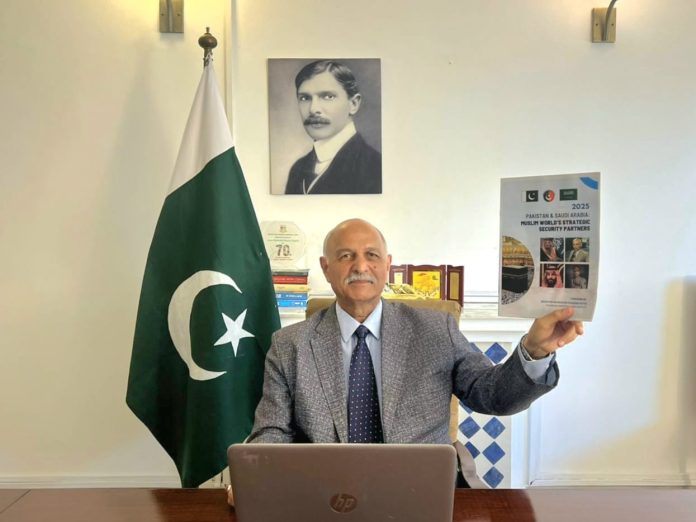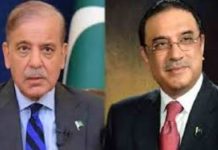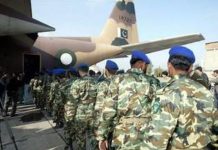Acclaims ‘first Muslim Defence Pact as plus for Pakistan’s Middle East new role’, praises MBS as ‘Muslim reformer who’s transforming Saudi Arabia’
DNA
Islamabad, September 28, 2025: Senator Mushahid Hussain Sayed today released the first comprehensive research report on the significance and implications of the Pakistan-Saudi Defence Agreement, prepared by the Pakistan-China Institute, the think tank he heads, on ‘Pakistan & Saudi Arabia: Muslim World’s Strategic Security Partners’. The 31-page report carries a Foreword by Senator Mushahid Hussain Sayed, Key Points of the Report, as well as significance, implications and the geopolitical context of the historic Pakistan-Saudi Arabia Defence Agreement of 17 September, 2025. The report also contains a Fact Sheet on major diplomatic events on the Pakistan-Saudi relations as well as key military agreements and Pakistan’s track record in providing security support to Muslim countries in the Middle East. Senator Mushahid Hussain said this landmark defense agreement was the result of ‘two key decision-makers: Field Marshal Syed Asim Munir and Saudi Crown Prince & Prime Minister Mohammed bin Salman (MBS), who’s a Muslim reformer, rapidly transforming Saudi Arabia, just like Deng Xiaoping did for China’. He added that MBS has the potential to be the ‘most consequential leader of Saudi Arabia since King Faisal’.
Launching the report at a media interaction here today in Islamabad, Senator Mushahid Hussain cited three fundamental reasons for this defence agreement. Pakistan’s new image and enhanced diplomatic role following the May 2025 victory over India, coupled with the changing geopolitical landscape of the Middle East, namely, rising threat of ‘Greater Israel’ aggression, now viewed as the main threat to Muslim countries, and loss of confidence in American security guarantees. He said, this agreement with Saudi Arabia, is ‘historic and significant because after 50 years, Pakistan is again playing a military role in the Middle East as a net security provider for the Muslim world’s most important country, the Kingdom of Saudi Arabia’. He recalled during the October 1973 Arab-Israeli War, when Zulfikar Ali Bhutto was Prime Minister, PAF pilots flying in combat against Israel on behalf of the Air Force of Syria and Egypt, even shot down an Israeli war plane. He added, then, with the sponsorship of King Faisal of Saudi Arabia, Pakistan hosted a special Islamic Summit at Lahore in 1974, where the Palestine Liberation Organization (PLO), under Yasser Ararat, was accorded recognition as the sole legitimate representative of the people of Palestine for the first time.
Explaining the timing of the Pakistan-Saudi Arabia Defence Agreement, Senator Mushahid Hussain cited three reasons for the timing of this agreement. First, the Israeli aggression against Qatar, which is a country allied with the United States and which is a peaceful country, where Israel and the United States had been meeting representatives of the Palestine resistance movement, Hamas. This showed that Israel has designs of imposing its hegemony in the region through military force, as part of its ‘Greater Israel’ designs. Qatar is the 6th Muslim country that Israel has launched aggression against, following Palestine, Iran, Lebanon, Syria and Yemen.
Second, he said, ‘Pakistan emerged as a security alternative in the Middle East after the vacuum created by the US failure to prevent or oppose the Israeli attack on Qatar.’ This was a turning point in Middle East politics, he added, because Qatar also hosts the largest American military base in the region and the United States was committed to protect the security of Qatar through its military forces and technology, a role which the US failed to play, thereby indicating that the United States could no longer be relied upon as a protector of the security of friendly Muslim countries in the region’. He added: ‘ This security vulnerability of Gulf states has been reinforced after the Qatar attack, because, earlier in 2019, Saudi Arabia’s oil installations were attacked and, similarly, there was no American effort to stop that attack to defend Saudi Arabia’. Given this context, ‘the Muslim countries in the region have now started looking at new security options’ and with Pakistan’s track record of defence cooperation with Muslim countries, ‘Pakistan has, therefore, emerged as a feasible alternative to provide effective security for Muslim states, as and when needed’. He said, apart from the defence accord with Saudi Arabia, Pakistan’s pan-Islamist role and vision were also evident when Pakistan strongly backed Iran’s fight against Israeli aggression. In the same spirit, Mushahid recalled that ‘during the 2022 World Cup in Qatar, the first such global sporting event in the Muslim World, security was provided by Pakistan Army’.
The third reason, according to Senator Mushahid Hussain, for this security agreement is that ‘Pakistan has proved its muscle in the military domain when it successfully defended against Indian aggression in May 2025, in fact, giving a bloody nose to a numerically superior and a larger and stronger adversary, a fact that has been confirmed by none other than President Trump, which enhanced Pakistan’s image and regional reputation’. In other words, he added, ‘Pakistan has demonstrated the Will, Skill and Capability and the political and military strength to take on and defeat India, which is the key ally of Israel’. During the Indian aggression against Pakistan, Israeli Harop drones were active in operation against Pakistan and Pakistan managed to shoot down over 80 of these sophisticated drones, thereby demonstrating Pakistan’s ability to have both defensive and offensive military capability.
Senator Mushahid Hussain Sayed also mentioned that Muslim countries from Egypt to Iran had welcomed the Pakistan-Saudi Arabia agreement, which meant there is yearning for Muslim Bloc military solidarity. This was hinted by Iranian President Masoud Pezeshkian, who termed the agreement as a ‘step towards a comprehensive regional security system with the cooperation of Muslim states’. Senator Mushahid Hussain termed the Pakistan-Saudi Arabia Strategic Defence Agreement as a ‘welcome and timely development since it will help contain the emerging Indo-Israeli Axis, and in the process, this agreement has also buried the plan of Biden and Modi announced during the G-20 conference in September 2023, of launching IMEC (India Israel Middle East Economic Corridor) which was meant to counter CPEC and China’s Belt & Road Initiative (BRI)’. He said ‘IMEC now lies buried under the rubble of Gaza Genocide and under the sands of Arabia after the Pakistan-Saudi Arabia Defence Agreement’.
Concluding, Senator Mushahid Hussain said that Pakistan is now playing a proactive diplomatic and security role as a Major Muslim Middle Power and the Pakistan-Saudi Arabia security partnership provides for a new template of regional security, with a natural combination of Pakistan’s military muscle and Saudi Arabia’s economic strength to provide for deterrence against any kind of aggression. Pakistan has demonstrated, with its professional, battle-inoculated, well-trained armed forces, the capacity of taking on all kinds of military challenges with courage, competence and determination.
This is the third major research report launched by Senator Mushahid Hussain in recent months through his think tank, the earlier ones focused on the Pakistan-India military encounter in May and the implications for Pakistan of the Rwanda-Congo Peace Deal. Senator Mushahid Hussain said that the most important challenge now would be in the domain of “Battle of Ideas” that Pakistan and friendly countries like Saudi Arabia would be facing, hence, Muslim think tanks should be prepared to take on this challenge with detailed fact-based research reports to counter disinformation and fake news.

















